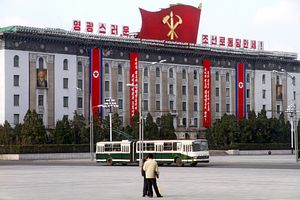North Korea has never attempted to present a rational front to the international community or its press. In fact, many observers believe Pyongyang maintains a policy that vacillates between appearing weak, fierce and unpredictable. If that is indeed the case, then the strategy has rarely been more evident than it is right now, yet its unpredictability and inherent weaknesses have been much more evident, despite attempts to display its military might this summer with repeated ballistic missile launches.
North Korea’s isolation intensified over the summer, as relations with South Korea stalled and ties with China deteriorated precipitously after leader Kim Jong-un’s uncle, former vice chairman of the National Defense Commission Jang Song-thaek (who was Pyongyang’s strongest link to Beijing) was executed in the culmination of an apparent power struggle. North Korea’s one legitimate lifeline in the region since May has been Japan, which is still negotiating the release of its citizens captured during the 1970s and 80s. However, even those talks have begun to flounder.
After Pyongyang missed the target for its initial report into the abductees last week, frustration has been increasing domestically in Japan as its leaders seek to pressure North Korea to make progress and report on the issue. The Nikkei reported that a survey it conducted over the weekend found that 57 percent of Japanese people now want the government to put additional pressure on Pyongyang, with only 33 percent supporting a “wait-and-see stance.” Meanwhile Japanese and North Korean officials met in the Chinese city of Shenyang on Monday for four hours, with Japan’s director general of the Foreign Ministry’s Asian and Oceanian Affairs Bureau Junichi Ihara telling the press afterward that he pressed Japan’s “strong interest” in making progress on the report, saying he believed North Korea’s ambassador in charge or normalizing ties with Japan, Song Il-ho “knows very well that the abduction issue is one of our biggest challenges,” according to the Jiji Press.
Yet North Korea gave little indication that it was speeding up or intensifying its investigation. No mention was made of a new date for the initial report’s release, with Song merely saying, “Both sides agreed to … cooperate well, and both sides shared the view to continuously put effort into doing so. For sure, the talks were not about reporting results of the investigation.” North Korea had been attempting to extract assurances from Japan for further sanctions relief in the lead-up to the expected report release, which Japan would not commit to without evidence of progress. Both sides appear to be trying to keep negotiations alive, yet Pyongyang now risks losing a key potential avenue for the further removal of sanctions and possible aid.
North Korea’s ties with China have also not improved over the summer, with its secretary in charge of international affairs for the ruling Workers’ Party, Kang Sok-ju being snubbed twice by Chinese officials while transiting through Beijing on a tour of European countries. The trip was intended to improve strained ties with Europe, yet Kang was also expected to meet with the head of the CPC’s international department, Wang Jiarui. South Korean diplomatic sources told the Yonhap News that the meeting never happened, and that Kang’s trip was an attempt to end North Korea’s current isolation.
While Pyongyang’s isolation intensifies, its leader has become absent from public appearances. Kim Jong-un has not been seen in public for three weeks, a long time for a new leader who is fond of touring the country and being seen by its people. The North Korean press has acknowledged that Kim is currently experiencing some “discomfort,” which observers speculate could be a health problem such as gout. His absence was made more conspicuous when he missed his first session of parliament last Thursday, and he was not present when Mongolia’s Vice-Chairman State Great Hural R Gonchigdorj led a parliamentary delegation to Pyongyang on Monday. Instead they were received by Kim Yong-nam, president of the Presidium of the Supreme People’s Assembly.
As stated earlier, it is not uncommon for North Korea to behave unpredictably, and it has endured hardships over the last 20 years that would have weakened and dissolved other states. So while its current isolation is not overly abnormal, it is nonetheless not accompanied by the usual bluster and threats of nuclear tests or military action against South Korea. Indeed, on Saturday its Foreign Minister Ri Su-yong told the UN General Assembly that it was willing to cooperate with international organizations on human rights, despite the UN’s report in February, which found evidence of crimes against humanity from the regime in Pyongyang. Few international observers credit the Hermit Kingdom with behaving in a rational manner, yet its current behavior appears to be drifting out of its usual, if slightly illogical, pattern of threatening its neighbors when it finds itself isolated.

































